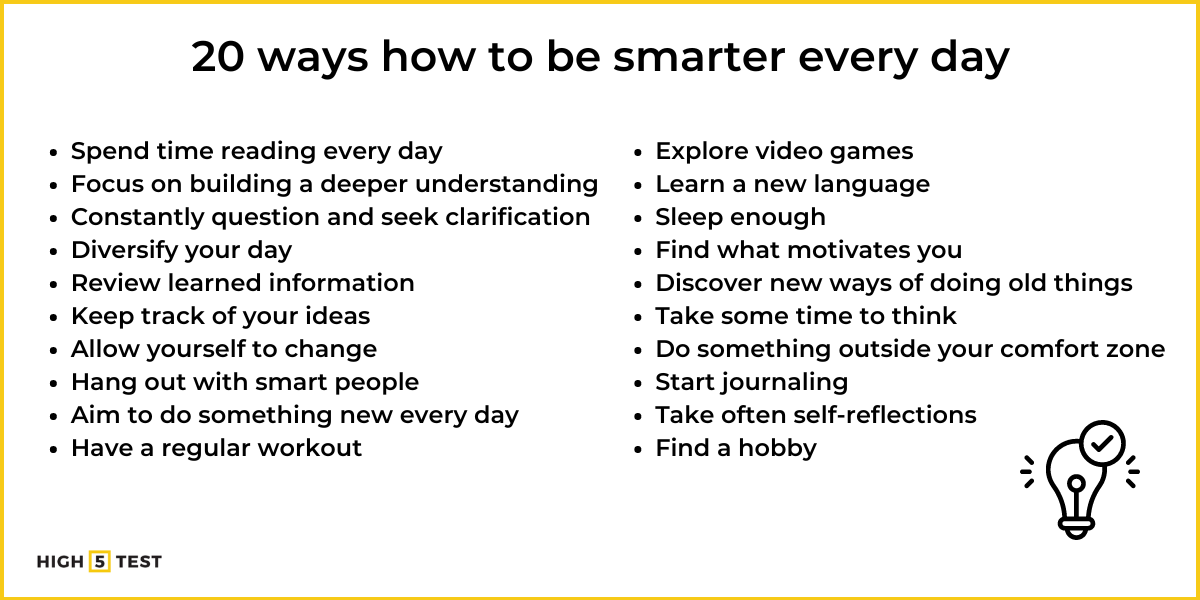Figuring out how to get smarter – more confident, creative, analytic, and decisive in our lives – is something each and every one of us strives for. a question that plagues everyone. However, the path to enhancing your cognitive abilities goes beyond just developing general habits – it requires understanding and capitalizing on your unique strengths. The HIGH5 strengths assessment can provide invaluable self-awareness, allowing you to identify your natural talents and develop strategies tailored to your distinctive way of thinking and learning. Whether it’s answering your kids’ questions, pursuing further education, or maximizing productivity, leveraging your strengths through HIGH5 can unlock your full potential for growth.
Importance and benefits of being smart
Everyone can benefit from improving their cognitive abilities. People with higher intelligence have developed certain habits, skills, and mindsets that empower them in their work, their studies, and their personal lives. Studies have shown that not only are intelligent people more prone to success, but intelligence is also associated with a range of physical and mental health benefits, promoting a longer lifespan [1].
While the word intelligence is often associated with genetics and inheritance, being smart refers to people who have improved their minds through study and learning. Enhancing their cognitive abilities is a goal that anyone is capable of achieving, but it requires training and practice on an everyday basis. In this article, you will learn the secret ways, habits, and mindsets of people who are smart. Let’s get right into it.
Benefits that most smart people possess
Here are 10 benefits that smart people experience:
- They have better decision-making skills
- They are more confident
- They have better communication skills
- They are mentally aware of what’s going on around them
- They can easily see flaws in an argument or idea
- They know when to say “no” when it is appropriate
- They are more creative
- They have a strong desire to learn and explore new things
- Their brains can process information faster than others
- Smarter people think before they act or speak, which makes them better leaders
20 best ways & habits to become smarter every day
There are some specific ways and habits that smart people follow to improve their mental abilities and keep up their intelligence. Here are 10 things that smart people do regularly:

1. Spend time reading every day
One of the best ways to keep your brain active and provoke new ways of thinking is to read. Reading can expand the mind in a variety of ways. It helps your brain grow through exposure to new words, concepts, and ideas that stimulate creativity. It expands your knowledge, vocabulary, and verbal abilities [2]. Furthermore, literary fiction has been shown to improve our understanding of other people’s beliefs and inner lives, enriching our social experiences and relationships [3]. Spend time reading every day, even if it’s only 15 minutes before bedtime. You can also listen to audiobooks on your commute or during your workout session. Make sure you read something challenging that will expand your knowledge, enabling you to grow as a person.
2. Focus on building a deeper understanding
Smart people focus on building a deeper understanding of the world around them by leveraging their strengths. For instance, the HIGH5 assessment can reveal if you possess exceptional analytical abilities, empowering you to grasp core concepts through rigorous dissection and questioning. Conversely, those with strong social intelligence may build deeper understanding through collaborative discussions and diverse perspectives. By aligning your learning approaches with your innate talents, identified through HIGH5, you can develop true mastery over subjects rather than merely passing exams. When you master these core elements, you can learn how they relate to other subjects and come up with some amazing new ideas For example, if you are learning about history, don’t just focus on memorizing dates or names. Focus instead on understanding why certain events unfolded in the way they did and how they affected the world.
3. Constantly question and seek clarification
To get smarter every day, you need to think critically and seek clarification on everything you’re reading, learning, or discussing with others. Smart people don’t just accept what they are told, they ask questions and seek information in order to make the right conclusion. These strategies prove helpful to expand your knowledge base, as it invites you to consider every aspect of a subject rather than just the surface level. For example, when you watch TV or read articles online, always pay attention to the presenter’s words and reflect on how they relate to what you already know about the topic, allowing you to explore new ideas and push your mind further.
4. Diversify your day
Smart people diversify their day by engaging in multiple activities and hobbies. New experiences will help your brain become more flexible and improve your problem-solving skills. When your brain gets used to doing the same thing every day, it starts getting lazy and won’t work as hard to come up with unique ideas or solutions. For example, if you’re a writer who spends a lot of time at a computer desk editing content all day, take a break and engage in some exercise instead. You can go for a jog or head out on a bike ride for half an hour before you return to the office. . This will help clear your head and view work with fresh eyes
5. Review learned information
Smart people are always reviewing new information at the end of every day so they can solidify the knowledge in their minds. Doing this results in a deeper understanding of all details that make up a subject, and helps you come up with new plans or ideas. For instance, if you just learned how to solve a problem after reading an article or book, take five minutes before you go to bed to explain it to yourself again. This might help cement the new information into your brain for when you need it later on.
6. Keep track of your ideas
If you want to keep track of your ideas, it’s important not to leave them in your head, or they will have a tendency to disappear. Smart people know that if an idea is important enough, it must be written down or recorded in some way so that it doesn’t slip away – for instance in a journal or on a computer to have something concrete to revisit when you need it later on. You can also use tools like Evernote or OneNote so you don’t need to carry around pen and paper everywhere you go. Let’s say you wanted to start reading more books. Write down “Buy a new book” in your journal or occasionally set a reminder on your phone so that the next time you walk past a bookstore, you will remember when it’s time to buy a new one.
7. Allow yourself to change
Smart people have a habit of being open to change, allowing them to be more flexible and learn new things. People who are stuck in their ways can sometimes be afraid of change because they feel comfortable with how they currently spend their time. Their life becomes a routine, and every day is the same, so when something new comes along, they aren’t ready for it. They may also think that changes take up too much of their time so why bother trying? However, smart people know that growing as an individual takes effort and if you want results, you might need to make sacrifices. For example, if you find your current job isn’t fulfilling or making enough money, it doesn’t help to sit still in the boat and wait for an opportunity to come sailing your way – you need to actively work on improving your skills and seeking out new jobs to advance your career
8. Hang out with smart people
People are often attracted to others with similar interests, personalities, or goals in life, as they are easy to relate to. However, being around the same types of people every day gets boring over time, so you might need to take some risks and meet new people. Smart people know the value of expanding their social circle.They try to surround themselves with people who have different lifestyles or values, opening them up to new ideas that might benefit them in the future.
9. Aim to do something new every day
Smart people aim to constantly learn about new things, allowing them to grow as individuals. They regularly try out new activities in order to expand their minds and find new approaches. If you want to improve yourself, you need to put yourself in novel contexts. This could either to practice a new skill, sport, or hobby, or simply observing how others live their lives. Let’s say your routine is to sit down and watch TV every day when you get home from work. Try making plans with friends instead, doing something that you’re not usually accustomed to.
10. Have a regular workout
It’s a known fact that the mind and the body are connected, and regular exercise affect your mental health in many positive ways. It helps you live an overall healthy lifestyle, which results in making better decisions and clearing your head. If you never find time for exercise in your daily life, but you often go over to your friend’s house for dinner, try swapping one dinner a week for a gym session and you will start to see the difference.
Pro Tip From HIGH5
Identify your dominant strengths through the HIGH5 test, then apply them purposefully when learning new material. If you excel in strategic thinking, approach topics by breaking them into components and mapping out relationships. If ideation is your forte, explore subjects through brainstorming, mind-mapping, and finding novel connections. Adapting your study methods to your strengths will accelerate meaningful understanding.
11. Explore video games
Playing video games can improve problem-solving skills, hand-eye coordination, and strategic thinking, making it a fun way to boost cognitive abilities. Many games have multiplayer options and even allow cross-platform playing, so this may also help stay social and potentially connect with new people.
12. Learn a new language
Learning a new language enhances memory, improves multitasking skills, and increases cultural awareness, contributing to overall intelligence.
13. Sleep enough
It is a well-established fact that adequate sleep has a lot of health benefits [4]. It is crucial for cognitive function, memory consolidation, and overall brain health, ensuring optimal performance during waking hours. Therefore, it is smart to have a set routine for when to go to bed and when to wake up in the morning, plus avoid disturbing factors such as drinking caffeine and using electronic devices right before bedtime.
14. Find what motivates you
Identifying your personal motivations can drive you to achieve your goals more effectively, fostering continuous learning and growth.
15. Discover new ways of doing old things
Innovating and finding new approaches to familiar tasks can stimulate creativity and improve problem-solving skills.
16. Take some time to think
Allowing yourself time for reflection and contemplation can lead to deeper insights and better decision-making. Take a moment each day to turn off the TV, put away your phone, and sit down to be in the moment, letting your thoughts flow naturally. Mindfulness and meditation can also help with this.
17. Do something outside your comfort zone
Engaging in new and challenging activities can expand your horizons and build resilience, enhancing your adaptability and intelligence.
18. Start journaling
Writing regularly in a journal can help organize thoughts, clarify ideas, and improve self-awareness, contributing to personal growth.
19. Take often self-reflections
Frequent self-reflection helps in understanding your strengths and weaknesses, allowing for targeted improvements and personal development.
20. Find a hobby
Pursuing a hobby you enjoy can provide a mental break, reduce stress, and foster creativity, contributing to overall mental well-being.
The different types of intelligence
Intelligence is not a divided phenomenon, but rather a general concept – people who perform well in some areas, such as sports or mathematics, tend to perform well in other areas too [5]. However, in the pursuit of becoming smarter, there may be specific areas or cognitive abilities you may wish to improve more than others. In order to define which tasks or activities to practice, it can be useful to separate intelligence into the following categories:
Linguistic intelligence
- Writing and using words to express themselves
- Reading, speaking, and grammar
- Board games like Scrabble that depend on a knowledge of words
Numerical intelligence
- Talent for mathematics and puzzles
- Using logic and reason to solve problems
- Patterning and probability
Kinesthetic intelligence
- Physical activity that demands coordination
- Great control over their bodies
- Uses tools like building blocks and chalkboards to act out their learnings
Musical intelligence
- Carrying out tunes of music and matching certain pitches
- Excellent sense of rhythm
- Creative with sound to create beats
Spatial intelligence
- Ability to visualize and manipulate objects in space
- Skills in designing, drawing, and constructing
- Activities like solving mazes, puzzles, and engaging in architecture
Interpersonal intelligence
- Understanding and interacting effectively with others
- Skills in communication, empathy, and teamwork
- Activities like group projects, counseling, and social events
Intrapersonal intelligence
- Deep self-awareness and understanding of one’s own emotions and motivations
- Skills in self-reflection, goal-setting, and personal growth
- Activities like meditation, journaling, and personal development workshops
Naturalistic intelligence
- Ability to recognize and categorize plants, animals, and other aspects of nature
- Skills in observation, conservation, and environmentalism
- Activities like hiking, gardening, and studying wildlife
Logical-mathematical intelligence
- Proficiency in reasoning, problem-solving, and abstract thinking
- Skills in scientific experiments, coding, and logical games
- Activities like chess, programming, and conducting research
Existential intelligence
- Ability to ponder deep questions about existence and life
- Skills in philosophy, theology, and abstract reasoning
- Activities like debating philosophical concepts, studying religious texts, and contemplating life’s big questions
How can I improve my learning abilities?
There are many different ways to improve your capability of learning, whether at work, in educational settings, or in personal activities, such as learning how to drive or learning a new language. Below you will find some good tips that can help you process information more efficiently and better your success. including the following:
Make sure to ask questions
In all classes and courses you take, you will encounter things that are confusing, hard to understand, or even facts that are incorrect. Although teachers and lecturers are competent in their fields, they may not always present facts correctly, and they may angle information in a way that can seem confusing or misleading. It’s therefore important always to ask for clarifications if you are uncertain. For example, if your teacher says that driving over the speed limit is against the law, you may ask them specifically how fast you can go before it’s considered speeding. This gives you a chance to clear up any confusion and also learn something new about the subject. Don’t be afraid to be the one that speaks up. This will also benefit your classmates, who might be in the same situation as you, so keep this in mind when taking notes in class.
Form a study group
Sometimes it can be difficult to study by yourself. Everyone learns differently, so discussing, cooperating, and sharing notes with others may help you find new approaches, stay motivated, and better understand the subject. The best way around this is by forming a study group because you can learn from each other.
Make a schedule
Set up a weekly schedule for when to study and practice new skills or techniques, and what to complete by each day. This will prevent you from feeling stressed or overwhelmed, and let you organize and complete your tasks in time without having too much to do at once.
Take notes by hand
Taking notes by hand has been shown to be more efficient than using a computer, as it enhances your focus and facilitates learning.
Learn from others’ mistakes
When you’re studying for an upcoming test, ask a friend who has already completed it to explain where they potentially went wrong. This will help prevent you from making the same mistake, and it will teach you how to answer the questions.
Take your time
When taking a test, you might be tempted to answer as soon as you can to get it over with as quickly as possible. However, if there’s more than one correct answer, this isn’t very smart. You may fail to distinguish right from wrong or miss potential solutions. Teachers are able to see how much effort you put in, so rushing through the test may also affect your grade. Instead, read through each problem thoroughly and don’t write anything down until you’ve taken your time to reflect on the answer.
Look out for patterns
When you’re studying for an upcoming test, look at the exams from the previous years, so you can find any patterns in how the questions are presented. The best way to do this is by looking up old tests online or asking former students about the tests they received, and you may find that people love talking about their grades and past exams.
Practice makes perfect
An essential way to get smarter in school and improve other skills is to practice as much as possible. Going through the material thoroughly and practicing with past assignments can help you improve your final grade.
How to get smarter in math?
If you want to get smarter in math, practice the methods presented in the former section and identify which one helps you better learn and remember the techniques. In addition, math is centered on learning by doing, you should try executing as much as possible, instead of just reading through your textbook and trying to memorize everything.
Here are some really good ways to get smarter in math:
- Write down any formulas you need – When you’re studying for a math test, write down all of the equations that you need to know. Don’t worry about writing them down in any particular order, as long as you can read it back to yourself., to avoid careless mistakes while copying things out.
- Make use of mnemonics – Whenever possible, find mnemonic devices for solving each problem, as this has proven an efficient way of memorizing facts and information.
- Don’t worry about other’s opinions – FBe confident in your abilities and don’t let anyone intimidate you, even if they come across as smarter than yourself. Everyone has strengths and weaknesses, and there’s nothing wrong with needing more time than others to learn new things.
How can reading help you in getting smarter?
As discussed earlier, reading is a great way to improve your vocabulary and verbal abilities, exposing you to new words and concepts. Reading books on personal development can also be beneficial to discover new things about yourself that can help improve your life, including how to set new goals. You can also take different tests/quizzes (such as the HIGH5Test) to help you identify your strengths. They only take a few minutes and the results can be very interesting.
How can you become more creative?
You may think that creativity is something is something you are born with – some people have a knack for drawing, a musical ear, or a natural talent for writing. Although this may be true to some extent, in reality, developing creative abilities requires a lot of practice. “Practice isn’t the thing you do once you’re good. It’s the thing you do that makes you good”, Malcolm Gladwell says [6], and it takes 10,000 hours to achieve expertise in a skill. So don’t wait for your muse to strike – set off time week to sit down in front of your computer, your canvas, or with your guitar and practice your skills, and you will shortly experience the satisfaction of progress.
How can physical activity improve your intelligence?
Have you always wanted to become a dancer, learn martial arts, or be part of a professional football team? There is nothing stopping you. Engaging in sports not only has a positive effect on your physical health but also on your psyche, which again will help you find the energy you need to improve your intelligence and pursue your life goals. As with creativity, mastering sports and improving body coordination takes a lot of practice. Choose an activity you enjoy that gives you energy, to make the training fun and achieve great satisfaction as you watch your abilities ills improve.
Becoming smarter FAQ
How can I become more intelligent?
You can become more intelligent by continuously learning, challenging yourself with new activities, and adopting habits that stimulate your brain.
Can I train myself to be smarter?
Yes, you can train yourself to be smarter by engaging in activities that develop cognitive abilities, such as reading, problem-solving, and learning new skills.
What habits increase IQ?
Habits that increase IQ include reading regularly, engaging in physical exercise, getting enough sleep, and practicing problem-solving activities.
References:
- Maja Lundbäck. Why a Higher IQ Means a Longer Life. Karolinska Institutet. 2023 December 20. https://ki.se/en/research/popular-science-and-dialogue/spotlight-on/spotlight-on-healthy-ageing/why-a-higher-iq-means-a-longer-life#:~:text=Intelligence%20predicts%20success,and%20more%20or%20less%20stable.
- Stanovich KE. Does reading make you smarter? Literacy and the development of verbal intelligence? Advances in Child Development and Behavior. 1993:24:133-80
- Kidd DC, Castano E. Reading Literary Fiction Improves Theory of Mind. Science. 2013;342:377-380.
- Get Enough Sleep. U.S. Department of Health and Human Services. 2024 August 6. https://health.gov/myhealthfinder/healthy-living/mental-health-and-relationships/get-enough-sleep
- Waterhouse, L. Why Multiple Intelligences Theory is a Neuromyth. Frontiers in Psychology. 2023;14.
- Gladwell M. Outliers: The Story of Success. Back Bay Books; 2008.








